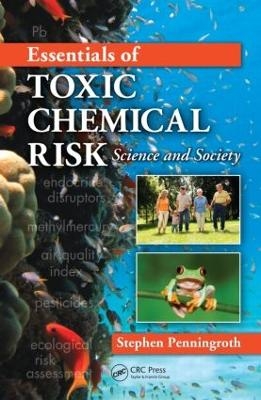
Essentials of Toxic Chemical Risk
CRC Press (Verlag)
978-0-415-24851-8 (ISBN)
- Titel z.Zt. nicht lieferbar
- Versandkostenfrei innerhalb Deutschlands
- Auch auf Rechnung
- Verfügbarkeit in der Filiale vor Ort prüfen
- Artikel merken
A contribution to the ongoing debate about how to manage the growing risks of anthropogenic chemicals in the environment, Essentials of Toxic Chemical Risk weaves together coverage of the science that underlies toxic chemical risk assessment, the physiological and molecular bases of chemical toxicity, the process of assessing toxic chemical risk to human health and the environment, and the strategies employed in managing it. The book links toxic chemical risk to the real world of people and communities confronted with the vexing problem of how to deal with products that make their lives better but that also harbor a potential for harm.
The book introduces the basics of toxicology from a risk assessment perspective, using a jargon-free, journalistic style that makes scientific concepts accessible to a wide audience without "dumbing down" the science. It covers the fate and transport of chemicals in the environment, dose-effect, animal toxicity testing, human epidemiology, the uptake, distribution, and elimination of toxic chemicals including first-order rate constants and calculations of body burdens, and the cellular basis of cancer and other diseases that can be caused by toxic chemicals. The book also introduces risk management and discusses the balance between precaution and socio-economic benefits, as embodied by the Toxic Substances Control Act, the Canadian Environmental Protection Act, and the European Union’s innovative REACH directive (Registration, Evaluation, Authorization, and Restriction of chemicals).
Putting equal emphasis on the twin issues of risk assessment and risk management, the author has carefully selected topics that shed light on risk management decisions and cover ecotoxicolocy and organismic toxicology. The book provides a thorough introduction to the science of toxicology and to the policy debates and scientific uncertainties that make risk management a work in progress.
Stephen Penningroth was educated at a German Gymnasium, did his undergraduate work at Brown University and the Columbia University School of General Studies, and earned a Ph.D. in Biochemical Sciences from Princeton University in 1977. He served as an assistant and associate professor at the University of Medicine and Dentistry of New Jersey-School of Osteopathic Medicine, teaching pharmacology and toxicology to second-year medical and osteopathic students and performing basic research on cell motility with grant support from the National Science Foundation and the National Institutes of Health. Following a sabbatical leave, he shifted focus to science education, resigning from the medical school and moving to Cornell University as an adjunct faculty member in 1993. While at Cornell he designed and taught undergraduate courses in environmental, regulatory and reproductive toxicology and also acted as a technical advisor to three citizens groups at Superfund toxic waste sites in New York and New Jersey. Since 2000 he has served as Executive Director of the not-for-profit Community Science Institute communityscience.org in Ithaca, NY, which partners with citizen volunteers to address risks to water in the Finger Lakes region.
Toxic Chemical Risk as Science and Social Discourse. Environmental Pathways of Toxic Chemicals. Dose-Effect: The Foundation of Toxicological Science. Human Populations at Risk. The Cornerstone of Risk Assessment: Toxicity Testing in Animals. The Body’s Defenses against Chemical Toxicity. Mechanisms of Chemical Disease. Human Health Risk Assessment. Ecological Risk Assessment. Managing Chemical Risk in North America and Europe. Index.
| Erscheint lt. Verlag | 9.4.2010 |
|---|---|
| Zusatzinfo | 14 Tables, black and white; 30 Illustrations, black and white |
| Verlagsort | London |
| Sprache | englisch |
| Maße | 156 x 234 mm |
| Gewicht | 452 g |
| Themenwelt | Naturwissenschaften ► Biologie ► Ökologie / Naturschutz |
| ISBN-10 | 0-415-24851-5 / 0415248515 |
| ISBN-13 | 978-0-415-24851-8 / 9780415248518 |
| Zustand | Neuware |
| Haben Sie eine Frage zum Produkt? |
aus dem Bereich


